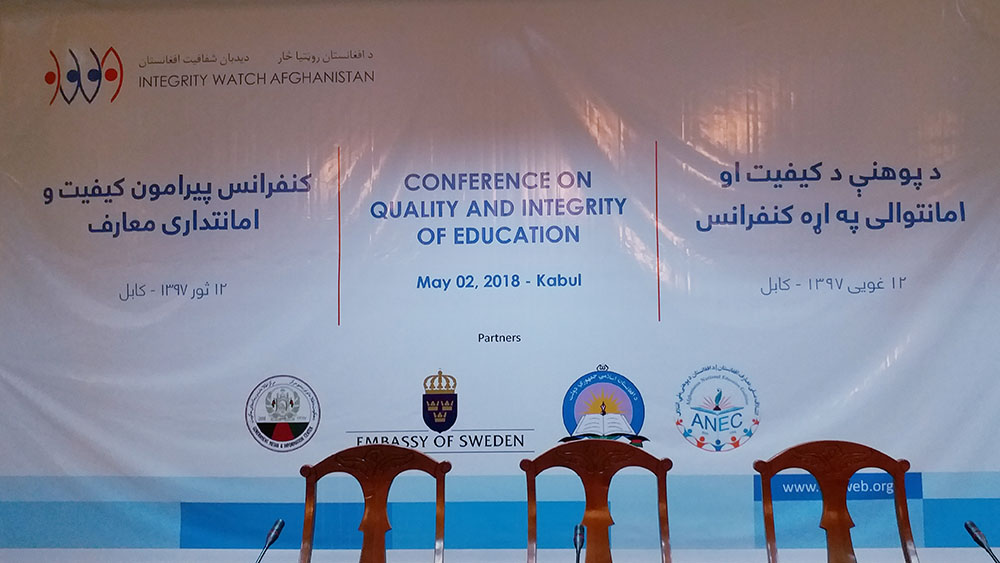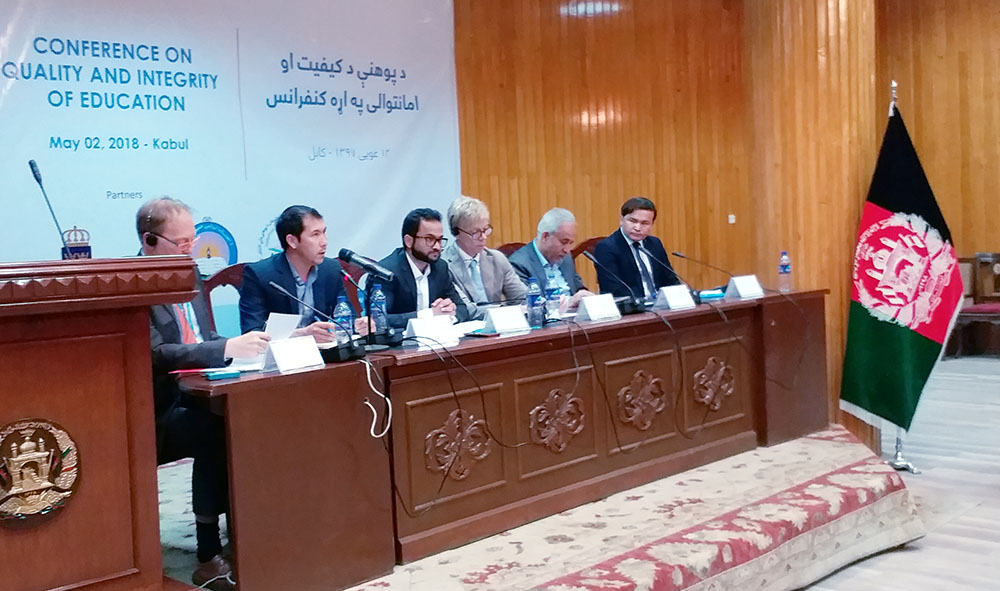Integrity Watch Afghanistan Conference Presents Key Findings of the School Facilities Report (May 2, 2018)

Representatives of the Afghanistan National Education Coalition (ANEC), the coordination body CSOs, NGOs working for education, participated the Conferences on "Improving Education Quality" organized by Integrity Watch Afghanistan on May 2, 2018.
The focus of the conference was on the key problems challenging the present education system.
The findings of the School Facilities Report of Integrity Watch Afghanistan done in 267 schools across 10 provinces in Afghanistan from 2015 till date underlined that present education system suffers from, insecurity, insufficient and low quality of school buildings, limited access to water and sanitation, limited availability of qualified teachers (especially female teachers), insufficient learning material, and corruption and mismanagement of resources.
Challenges of the education system:
Afghanistan has made efforts to develop the education system. The number of students in schools increased from around only one million in 2001 to more than nine million in 2015 (39% of which are girls). This is a commendable achievement in a country where service delivery of basic public goods has been tremendously complicated by over three decades of armed conflict. However, there remains a lot of challenges.
- These challenges include, among others, insecurity, insufficient and low quality of school buildings, limited access to water and sanitation, limited availability of qualified teachers (especially female teachers), insufficient learning material, and corruption and mismanagement of resources.
- More than 3.5 million children are still out of school. The quality of the teachers is low compared with the neighbouring countries and is a strong impact on the quality of learning outcomes.
- Nationally, only 43 percent of teachers employed fulfil the minimum criteria of 14 years of formal education.
- Moreover, the education system struggles to improve its quality with only 60 per cent of boys and 54 per cent of girls enrolled at the primary level completing grade 6.
These figures underpin the assumption that “…if students do not reach the last grade of primary section, they do not learn proper reading, writing and mathematics, and over the years the level of their understanding and literacy decreases.” (Education for All 2015, 26).
The primary factors that shaped the education sector and significantly affected MoE’s ability to deliver quality education are:
- Deteriorating security situation since 2004;
- Population boom,
- Return of millions of refugees from neighbouring countries,
- Migration and displacements of millions of people from villages into urban centres;
- Continued high poverty rate coupled with low economic growth;
- The role of international community and non-state actors to supporting the Afghan government.
- Corruption and centralized management of the education sector within the Ministry of Education.
- Contest over leadership of the Ministry of Education under the National Unity Government.
Budget cuts difficult task to dream for a better quality education result:
During the first discussion panel Mr. Sayed Ikram Afzali; Executive Director of Integrity Watch Afghanistan, Mr. Sardar Mohammad Rahimi, Deputy Minister for Literacy Education and the Representative of Swedish Embassy in Afghanistan, shared their concerns about the vulnerability of education in Afghanistan.
Mr. Afzali started present some of the important findings of the new study. Deputy Minister, Mr. Rahimi underlined the role of the education for the security of the country, and explained that while the budget for his literacy programs decrease year by year to less than 100 USD per student per year, it is a difficult task to dream for a better quality education result.
Representative of Swedish Embassy pointed out that investment on education, especially for girls reduces poverty and promotes sustainable development, Afghanistan should prevent misusing funds and should give priority to quality of education rather than building expensive schools.
Focus on children – Better coordination:
At the second round of the discussion panel, Mr. Naser Timory, Head of Advocacy and Communication IWA, Mr. Abdul Wassay Arian, General Director for Planning and Policy of MoE, Mr. Niclas Thalen, First Secretary Development Cooperation at Embassy of Sweden, Mr. Jan Mohammad Ahmadian, ANEC Secretary, the Representative of UNICEF and Mr. Hussain Rezaie from Independent Joint Anti-Corruption Monitoring and Evaluation Committee (MEC), shared their thoughts about current situation of education in Afghanistan.
Mr. Arian stated that we need better a management of using our sources and public observation from our activities. Mr. Thalen believed Afghanistan needs to accept the truth while having hope, because having hope without believing the truth results to fantasy and believing truth without hope causes failure. You should find the truth from the faces of the children and their feelings, which is definitely not about the hardware, the schools, they lack in their area. The Representative of UNICEF underlined the needs for better coordination among the organizations engaged in the field of education and the need the need for common action rather than individual activities. He added that it’s better to focus on children rather than classes. Mr. Rezaie talked about the MEC report prepared in October 2017 which showed immense corruption in Ministry of Education in key areas: teacher hiring, teachers’ capacity, salaries, procurement, massive curriculum, structure, literacy and management.
ANEC -NGO conference 11th March 2018 – think of a coherent and integrated approach:
Mr. Ahmadian from ANEC highlighted the role of education being the foundation of the society and for the stability in Afghanistan. To achieve quality education, we need to get united and let our activities be visible to all CSOs and in public. He mentioned that during the preparations of the NGO conference which will be held on 11th March 2018, H.E. President underlined that we are lag behind all MDGs and SDGs, so this is a collective failure of the Government, of NGOs, and people of Afghanistan. During the conference, H.E President emphasized three key areas where NGOs need to focus on:
- NGO’s work can be expensive- to think of cost efficiency and effectiveness
- NGO’s approach is project driven- to think of a coherent and integrated approach
- Accountability and Transparency – regular and transparent reporting system is required
The current report on schools along with MEC report on corruption and the Vulnerability and Aid Effectiveness Report should will be utilized by the assigned Working Group (MoE and CSOs) for enriching the content of position paper to current situation of education in Afghanistan.
At the end, he requested all CSOs, International Organizations and Donor agencies to share all their problems and solutions in terms of 3 highlighted points by H.E President.
ANEC along with Ministry of Education and the Taskforce Secretariat is going lead the NGO workshop on 13th May 2018 in close coordination with all CSOs, NGOs and INGOs to articulate NGOs voices working in education sector of Afghanistan and to collect all solutions to the 3 highlighted key point by H.E President to prepare and submit a national position paper.

